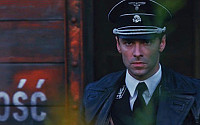| SHADOWS ON THE WALL | REVIEWS | NEWS | FESTIVAL | AWARDS | Q&A | ABOUT | TALKBACK | |||
| The Man Who Killed Hitler and Then the Bigfoot | |||

| |||
|
dir-scr Robert D Krzykowski prd Robert D Krzykowski, Patrick Ewald, Shaked Berenson, Lucky McKee with Sam Elliott, Aidan Turner, Caitlin FitzGerald, Larry Miller, Ron Livingston, Rizwan Manji, Nikolai Tsankov, Ellar Coltrane, Sean Bridgers, Kelley Curran, Mark Steger, Joe Lucas release US 8.Feb.19, UK 12.Aug.19 18/US Epic 1h38  Undercover Nazi: Turner 


 |
R E V I E W B Y R I C H C L I N E | ||
 There's a genre-busting sensibility to this movie, which combines historical thrills and fantastical adventure with strong dramatic undercurrents. Writer-director Robert Krzykowski packs each scene with wry attitude and witty filmmaking touches. So while much of the film is very funny, it also has a remarkable nostalgic kick, inventively swirling with earthy emotion and energetic action. It's certainly much more than the wacky title suggests.
There's a genre-busting sensibility to this movie, which combines historical thrills and fantastical adventure with strong dramatic undercurrents. Writer-director Robert Krzykowski packs each scene with wry attitude and witty filmmaking touches. So while much of the film is very funny, it also has a remarkable nostalgic kick, inventively swirling with earthy emotion and energetic action. It's certainly much more than the wacky title suggests.
Back in the war, American agent Calvin (Turner) infiltrates the Nazi elite to assassinate the fuhrer (Lucas), something he has never been able to speak about since. Decades later (now Elliott), he is happily pickling himself with alcohol, but there's life in the old dog yet. Everything reminds him of his past, from his secret undercover wartime assignment to awkwardly courting his sweetheart Maxine (FitzGerald). Then two shady government operatives (Livingston and Manji) approach him with a new mission: stop the Bigfoot (Steger) from destroying the world with a deadly virus. The title kind of gives away what happens, so Krzykowski fills the script with amusing, telling details as he flickers back and forth in Calvin's life. Production values are remarkably high, with lush cinematography (by Alex Vendler), snappy editing (by Zach Passero) and a superbly beefy score (by Joe Kraemer). Each scene bristles with dramatic implications, many of which are deliberately over the top. And the suspense and physicality are both intimate and riveting. Turner and Elliott add engaging layers to bring out Calvin's cynicism, humour and tenacity, weaving the timelines into a terrific single story. Both actors play the darker scenes beautifully, with Turner adding honest nervousness both to his Nazi mission and his attempts to woo Maxine, played radiantly by FitzGerald. Meanwhile, Elliott plays Calvin as a man haunted by regrets, sparked back to action by Livingston's agent, whose grandfather knew Calvin's secret. And his chemistry with Miller (as Calvin's little brother) is surprisingly moving. Even with some unfinished business, the script skilfully builds a grand narrative, adding quiet comments about social and political issues. Intriguingly, Krzykowski's alternate history is far more plausible than Turner trying to carry off Elliott's huge moustache. Most impressive is how the film depicts an old man coming to terms with the course of his life, beautifully underplayed by Elliott. These elements are the film's heart and soul, adding deeper layers to Calvin's climactic big adventure into the spectacular Canadian wilderness. And the thoughtful final scenes are properly moving.
| |||
| R E A D E R R E V I E W S | |||

 Still waiting for your comments ... don't be shy.
Still waiting for your comments ... don't be shy.
| |||
© 2018 by Rich Cline, Shadows on the Wall HOME | REVIEWS | NEWS | FESTIVAL | AWARDS | Q&A | ABOUT | TALKBACK | |||
